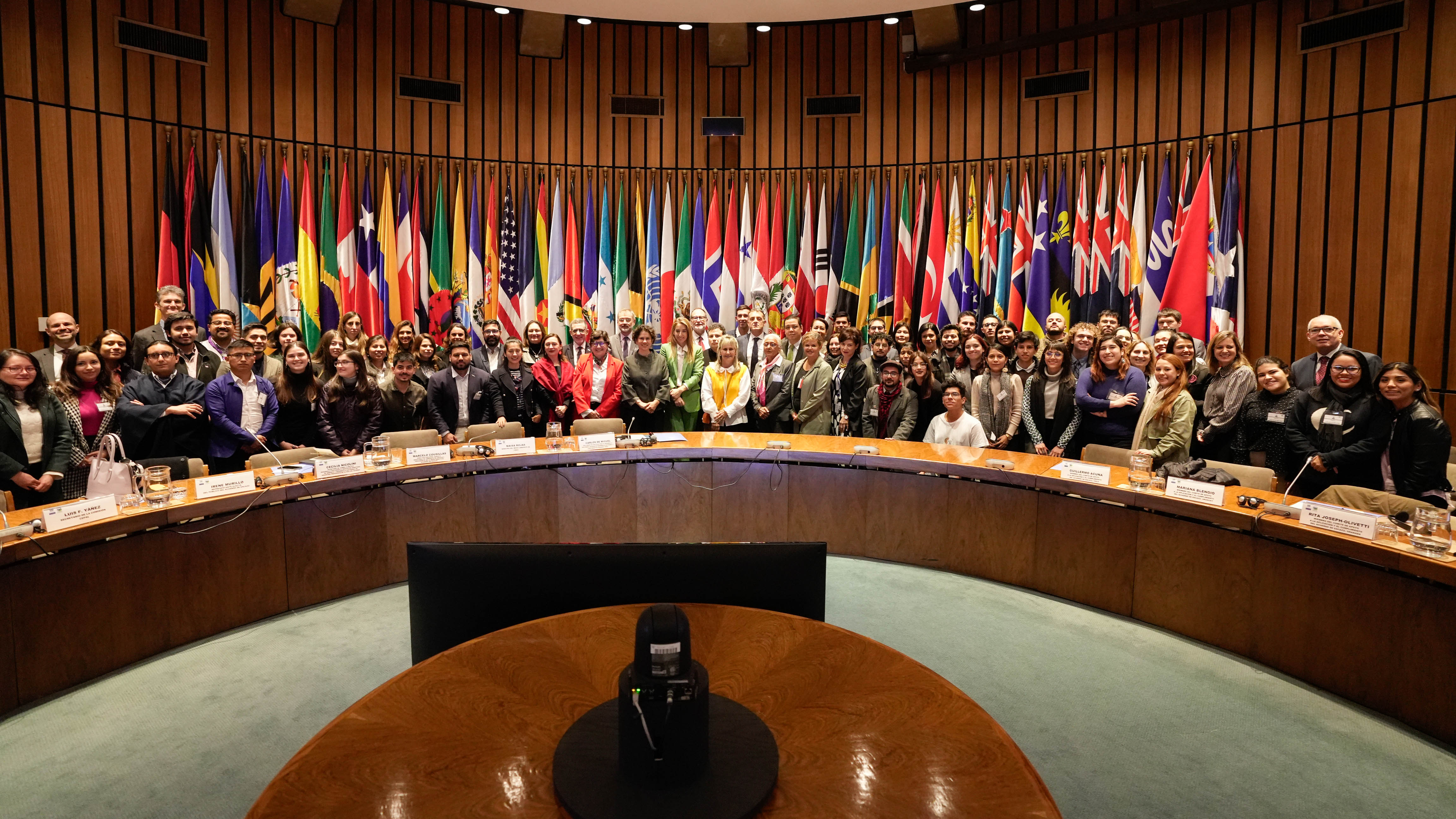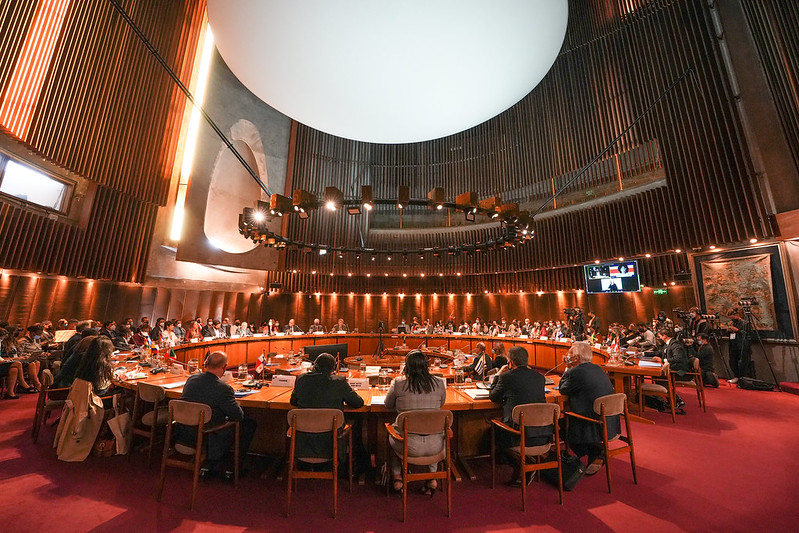Members of the Committee to Support Implementation and Compliance of the Escazú Agreement Assume Their Functions
Work area(s)
The swearing-in ceremony and first meeting of the Committee elected during the first regional environmental treaty’s COP 2 took place at ECLAC’s headquarters in Santiago, Chile.

The seven elected members of the Committee to Support Implementation and Compliance of the Escazú Agreement formally assumed their functions today, at a swearing-in ceremony held at the headquarters of the Economic Commission for Latin America and the Caribbean (ECLAC) in Santiago, Chile.
During the First Meeting of the Committee to Support Implementation and Compliance of the Regional Agreement on Access to Information, Public Participation and Justice in Environmental Matters in Latin America and the Caribbean – better known as the Escazú Agreement – the Committee members who were elected at the Second extraordinary Meeting of the Conference of the Parties (COP 2) held last April in Argentina carried out Decision II/1 of that meeting and committed to giving their utmost to provide dedicated, specialized and independent advice that contributes to the Agreement’s full and effective implementation.
At the Escazú Agreement’s COP 2, the countries that are parties to the treaty elected seven top-notch people – four women and three men – from five States Parties and two non-Parties, representing the three subregions of Latin America and the Caribbean (Mexico and Central America, the Caribbean and South America). They are Guillermo Eduardo Acuña (from Chile); Mariana Blengio Valdés (Uruguay); Rita Leonette Joseph-Olivetti (Grenada); Patricia Madrigal Cordero (Costa Rica); Andrés María Napoli (Argentina); Carole Denise Angela Stephens (Jamaica); and Félix Wing Solís (Panama).
The Committee’s swearing-in ceremony and first meeting was inaugurated by José Manuel Salazar-Xirinachs, Executive Secretary of ECLAC, the United Nations regional organization that serves as the treaty’s Secretariat; Marcelo Cousillas, Director of the Legal Advisory Department of the Environment Ministry of Uruguay, in its capacity as Chair of the Presiding Officers of the Escazú Agreement; María Cecilia Nicolini, Secretary of Climate Change, Sustainable Development and Innovation at the Ministry of Environment and Sustainable Development of Argentina, which served as Chair of the Escazú Agreement’s COP 2; and Irene Murillo, the Agreement’s elected representative of the public.
In his welcome remarks, ECLAC’s Executive Secretary indicated that the region arrived here today after traveling a long road involving collaborative regional construction. “We have equipped ourselves with a regional treaty, and our commitment to its implementation is reflected in the fact that we are instating its subsidiary body, the Committee, established in Article 18 of the Agreement. We should congratulate ourselves and thank and recognize all those who have participated and contributed to this achievement over all these years,” he stated.
He added that the Committee sworn in today plainly faces the challenging task of laying the foundation for its functioning to the benefit of the Parties and the region’s public, and of striving to bring to life the tenets of the Escazú Agreement – an agreement that is so necessary for our region, which has extraordinary natural wealth but is under serious stress. As an example, he indicated that in the region, the temperature increase caused by climate change, on its own, could force 3.2 million more people into situations of poverty. And during the COVID-19 pandemic, there was an intensification of illegal activities that harm the environment, he explained.
“The natural foundation of our socioeconomic system is being harmed and the most vulnerable people suffer the most. That’s why we must work together to transform our development model so it can enable us to improve the quality of life of all Latin American and Caribbean people, protecting our natural wealth,” José Manuel Salazar-Xirinachs emphasized.
Meanwhile, Marcelo Cousillas declared that today is an important day, a day on which environmental democracy takes another step forward to put Latin America and the Caribbean’s first environmental agreement into operation. “Last April (at the COP 2 of the Escazú Agreement), by consensus of the States Parties, we reached an agreement and elected seven people from our region who, due to their qualifications, their knowledge and experience, are going to make up this Committee of experts,” he said.
Cecilia Nicolini indicated that the region is once again facing major challenges that threaten its stability and its democracy. “The Escazú Agreement is a ray of hope, it is a bridge that beckons us to unite and work together to defend our territories,” Argentina’s Secretary of Climate Change underlined.
Meanwhile, the elected representative of the public, Irene Murillo, stated that the establishment of the Committee to Support Implementation and Compliance, in parallel to the plans initiated by the States Parties, puts us on the path to implementing the Escazú Agreement. “We are taking decisive steps forward. This is an innovative instrument tailored to the needs of Latin America and the Caribbean,” she said.
After the ceremony, the Committee to Support Implementation and Compliance of the agreement elected a Chair, Patricia Madrigal, and two Vice-Chairs, Andrés Napoli and Carole Stephens.
Towards the end of the meeting, Chilean Environment Minister Maisa Rojas spoke, emphasizing that it is necessary to improve the making of decisions and their implementation because we are in a critical situation and need transformative changes. “The last report of the IPCC (Intergovernmental Panel on Climate Change) indicates that we still have a window of opportunity to ensure an inhabitable and sustainable future, but that window is closing fast,” she warned.
“Chile is committed to the Escazú Agreement. We are working to strengthen our environmental democracy with the conviction that a safe and peaceful environment is essential for building more prosperous, sustainable, inclusive and resilient societies,” Minister Rojas added.
In addition, in the framework of the meeting, the Environment Ministry of Chile, through Minister Maisa Rojas and Undersecretary Maximilano Proaño, and ECLAC – represented by its Executive Secretary, José Manuel Salazar-Xirinachs – signed a cooperation agreement to contribute to the Escazú Agreement’s voluntary contributions fund.
Thus far, the Escazú Agreement has been signed by 24 countries of Latin America and the Caribbean and features 15 States Parties: Antigua and Barbuda, Argentina, Belize, Bolivia, Chile, Ecuador, Grenada, Guyana, Mexico, Nicaragua, Panama, Saint Kitts and Nevis, Saint Lucia, Saint Vincent and the Grenadines, and Uruguay.
The Agreement was adopted in Escazú, Costa Rica on March 4, 2018 and entered into force on April 22, 2021. The 24 countries that have signed it can proceed to deposit their instruments of ratification at any time at the United Nations central headquarters in New York. The countries that did not sign it within the first stipulated time frame (between September 27, 2018 and September 26, 2020) can become Parties through accession (a one-step procedure that necessitates no signature). The instruments of accession have the same legal requirements and effects as ratification.
Related content
Related link(s)
Country(ies)
- Latin America and the Caribbean
Contact
Public Information Unit
- prensa@cepal.org
- (56 2) 2210 2040
